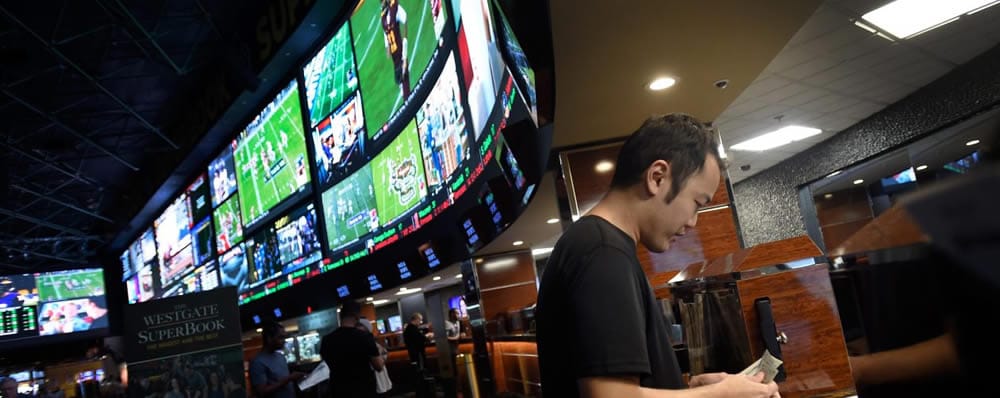- Many sports arenas have attempted to persuade legislators to allow sportsbooks in their stadium.
- While many states have approved or have begun discussing this option, there are a few who are strongly against it.
- Washington DC’s Capital One Arena is scheduled to bet the first in-stadium sportsbook when it launches in October.
TALLAHASSEE, Fla. – Sports betting has increased in popularity since the repeal of PASPA in May 2018. Since then, eight states (excluding Nevada) have launched legal sports betting venues, whose industries all greatly differ due to each state enforcing their own regulations.
Mobile betting was the big topic of 2018, as federal laws like the Wire Act prevented or discouraged states from knowing how to go about the operation.
Now, the focus turns to in-stadium wagering and whether or not professional sports arenas should offer sports betting services alongside the games.
Some arenas took a brief introduction to this though by adding a wagering-type game that awards the participants with prizes, autographed apparel, or (in states with legal sports betting) cash. Call The Shot was a predictive game for Sacramento Kings fans and HotStreak was unveiled during a New Orleans Pelicans game. Other teams’ fans such as the Washington Wizards and Philadelphia 76ers were introduced to an alternate TV broadcast that allowed participants to engage in propositional-style wagers.
However, a few states have shown their definitive support of in-stadium wagering – the most recent being the Illinois Sports Wagering Act.
The bill set the stipulations that seven stadiums would be permitted to offer sports betting services at an initial cost of $10 million and a renewal cost of $1 million. The stadiums must also have a seating capacity of 17,000 or more and be the home to a professional sports organization.
Many stadiums have begun applying, including Allstate Arena – home of the Chicago Wolves (an affiliate of the Vegas Golden Knights) – and even Wrigley Field.
Like Illinois, Washington DC set similar stipulations to allow for in-stadium wagering, including an exclusivity zone for the stadiums. In Illinois, no sportsbook can compete with a sports arena within a five-block zone, while in DC the exclusivity is set at only two blocks.
Ted Leonsis, founder and CEO of Monumental Sports (owner of the Washington Capitals, Wizards, and Mystics, as well as their stadium, the Capital One Arena), has begun renovating a former sports bar into the new sportsbook.
The idea behind the in-stadium sportsbook is that both spectators of the game, as well as passerbys on the street, can engage in placing a wager. The sportsbook is expected to launch in October, just before the start of the NBA and NHL season.
This expansion should no doubt help Monumental increase their revenue, which may influence other team and stadium owners to offer their services as well.
In an established market, the Prudential Center in New Jersey plays host to a William Hill lounge. Betting is not permitted within the venue per state regulations; however, those in the area that boasts comfortable seating with TVs showing games from around the world, are able to log into their William Hill mobile betting app after reviewing the odds displayed about the room.
The goal behind this is increasing fan engagement and experience. It becomes more about brand recognition and signing up new players more so than just allowing bettors to take action.
Across the Hudson, New York is in a similar situation. They have only approved sports betting at the four up-state commercial casinos but the professional stadiums have begun chattering about the possibilities of offering a sportsbook.
With support from the Buffalo Bills’ New Era Field and Madison Square Garden, Senator Joseph Addabbo, Jr. (D-Howard Beach) expanded the terms of his sports betting bill, NY SB 17, to allow stadiums to accept action as well.
But not every state is as supportive as the aforementioned ones. Indiana, through their approved sports betting bill, IN HB 1015, included terms to potentially prohibit mobile wagering while bettors are located within a stadium.
This is the first restriction seen on in-stadium wagering and likely due to the NCAA’s presence in the state.
Though the NCAA permitted states with legal sports betting to begin hosting postseason tournaments, they still hold a strong anti-gambling position.
A similar situation has been seen in Massachusetts, as the state’s end-of-May public hearing regarding sports betting noted many who were opposed to the Boston Bruins being able to offer a book.
As it stands, the Bruins are owned by Delaware North Corporation, who also own their stadium, TD Garden, and supply sportsbooks throughout the country.
The mindset from Senator Eric Lesser (D- Longmeadow), the co-chairman of the state’s Economic Development and Emerging Technologies joint committee who heard the testimonies, was that this created too much power for the company.
The belief that a team and stadium owner could also profit off a local sportsbook could provide many integrity issues or, at the very least, the speculation of such.
While many professional stadiums are owned by a company (or individual) that also owns the team who plays there (such as Monumental Sports), this is the rare example of a company that would potentially own all three.
There is no gauge as to how Massachusetts or Indiana will move forward with their in-stadium wagering plans, especially with the advancement of the idea elsewhere in the country.
Betting during games in the arena will likely be commonplace as more states approve legal sports betting in the future. To take an example from the UK, there are hundreds of stadiums that offer a betting parlor regardless of whether a game is being played or not.
English bettors are known for better utilizing live-betting than Americans, which makes having these opportunities so valuable overseas.
Perhaps with the growth of live betting in the US, more stadiums will get on board and want to have a hand in sports betting as well.
Advertising Disclosure
In order to provide you with the best independent sports betting news and content LegalSportsBetting.com may receive a commission from partners when you make a purchase through a link on our site.
News tags: Sports Wagering

After spending time scouting college basketball for Florida State University under Leonard Hamilton and the University of Alabama under Anthony Grant, Michael started writing focused on NBA content. A graduate of both schools, he now covers legal sports betting bills, sports betting revenue data, tennis betting odds, and sportsbook reviews. Michael likes to play basketball, hike, and kayak when not glued to the TV watching midlevel tennis matches.


 College Football Betting
College Football Betting Best Online Sports Betting
Best Online Sports Betting Best Legal NFL Betting
Best Legal NFL Betting States With Legal Sports Betting
States With Legal Sports Betting Sports Betting Events
Sports Betting Events




